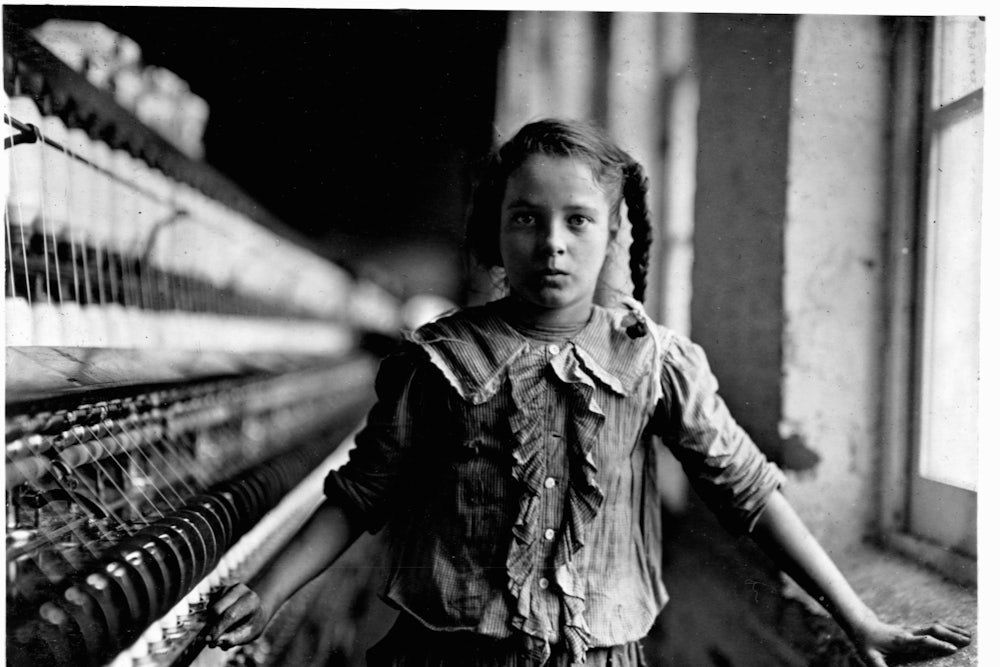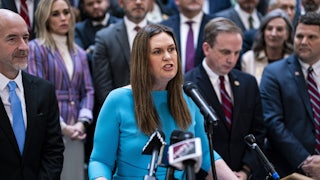The Republicans pride themselves on being the party that protects children. In the Republican Party platform of 2016, the most recent we have because the GOP didn’t produce one in 2020, the word “children” appears 35 times (32 after you eliminate references to zygotes, embryos, and fetuses). Look closely, though, and you’ll notice that when Republicans say “children,” they usually mean “parents,” and when they mean “parents,” they usually have bad ones in mind: too authoritarian or too neglectful.
The 2016 platform invokes individuals’ right to “raise their children by their own values,” to “direct their children’s education,” to “determine the proper medical treatment and therapy for their minor children,” to “consent for their daughter to be transported across state lines for abortion,” and so on. These rights—which even liberals support, up to a reasonable point—enter the political realm only when a parent abuses them.
What distinguishes the GOP is its extreme reluctance to compromise the principle of parental autonomy and its even greater reluctance to expose children to the influence of anybody who isn’t a parent. That includes teachers (the 2016 platform demands that “all personnel who interact with children should pass background checks”); medical professionals (when the topic is gender assignment or abortion); and the authors of any books that describe ways of being that are different from those encountered at home, or aspects of American history that might challenge conventional patriotism. As my colleague Melissa Gira Grant notes in The New Republic, the politicization of school curricula has lately spread to public libraries.
Just about the only sort of outsider Republicans will entrust with power over our children is the troubled soul (typically young, white, and male) who shows up weekly at some school or other with a firearm to kill or injure students and/or teachers. I say “weekly” because, although we saw 10 such episodes in 2020, that number rose to 35 in 2021 and 51 last year, according to a tracker maintained by Education Week. In the 11 weeks since the start of 2023 we’ve seen 10. Please keep in mind that these calculations exclude incidents where someone showed up with a gun and, happily, failed to kill or injure anybody. The GOP position on school shootings, as articulated in the 2016 platform, is: “We … oppose any effort to deprive individuals of their right to keep and bear arms without due process of law.” An overwhelming majority of Republican voters—a group that includes many moms and dads but zero children—opposes stricter gun laws of any kind.
Superficially, the Republicans’ parent-heavy approach to children’s issues makes political sense, because parents vote and kids don’t. But it isn’t foolproof. Sometimes Republican moms and dads don’t agree. That’s the case with the expanded child tax credit, which Republicans managed to end in December 2021. It’s no surprise that, three months before it was canceled, the extended credit was supported by 75 percent of all Democrats. But it was supported by 41 percent of all Republicans too.
Two issues have come to the fore lately where Republicans protect the rights of bad parents at so high a cost to their children that (as in the case of gun control) it’s grotesque for the GOP to claim to be pro-child at all.
The first is child labor, whose resurgence as a Republican cause I discussed last month. In that earlier story, I cited pro–child labor bills in Wisconsin and Iowa that didn’t pass. I mentioned only one, in New Hampshire, that did. I purposely ignored a New Jersey statute that extended the hours 16- and 17-year-olds could work during the summer because kids don’t go to school then, so it didn’t strike me as a big deal.
One week after I published that piece, Arkansas Governor and Republican Party darling Sarah Sanders joined presidential hopeful and New Hampshire Governor Chris Sununu in actually signing a pro–child labor bill into law. The law eliminates what a Sanders spokesperson termed a “burdensome” requirement for the state to verify the age of anyone age 15 or 16 who seeks employment. The law’s chief sponsor, Republican state legislator Rebecca Burkes, said the requirement “steps in front of parents’ decision-making process about whether their child under 16 years of age can get a job.” Uh, that’s why it was enacted back in 1914: because too many parents were sending their kids out to work rather than allowing them to attend school.
According to an important new report from the Economic Policy Institute, or EPI, at least 10 states have introduced bills weakening child labor protections during the past two years, and four have enacted them—New Hampshire, Arkansas, New Jersey, and (here’s one I missed) Iowa, which last year lowered (from 18 to 16) the minimum age for workers in childcare centers. The EPI report also said that the number of child labor violations has nearly quadrupled since 2015, from 1,012 to 3,876.
EPI added some new horror stories to a New York Times report by Hannah Dreier that occasioned my earlier story. Packers Sanitation Services Inc., or PSSI, a Wisconsin-based company that cleans slaughterhouses overnight, was found by the Labor Department last month to have illegally employed more than 100 children ages 13 to 17. Among the child workers’ duties was to clean meat and bone cutting saws, according to a legal complaint the Labor Department filed in November. PSSI is owned by Blackstone Group, the world’s largest private equity group, which of course called the violation “completely unacceptable.”
The second new area where the GOP supports parents at an unacceptably high cost to children is child marriage, which in most cases means child brides. Even as QAnon influencers (one of them, it turns out, a convicted pedophile) accuse Democratic leaders—falsely, I’m obliged to point out—of running child-molestation rings, Republican state legislators are opposing bills to raise the age of marriage consent to 18. The United States pledged to the United Nations seven years ago that it would end child marriage by 2030. But it doesn’t look like we’re going to make it, mainly because of Republican opposition.
Child marriage is legal in 43 states, according to a recent tally by The Washington Post, and in seven of these there’s no minimum age at all. Where procedural restrictions are imposed in states that allow child marriage, it’s usually only that the child receive permission from a parent (or, in some cases, a judge). All told, nearly 300,000 minor children (again, mostly girls) were married in the U.S. between 2000 and 2018, according to the group Unchained At Last, which seeks to abolish child marriage. Most were 16 or 17, but a few were as young as 10, and about 20 percent were below the age of consent in the state where the marriage was recorded.
Defending child marriage is, of course, a handy way for Republicans to wage class warfare on behalf of rural low-income whites. Soon after a child-marriage ban passed the West Virginia House of Delegates earlier this month, it got killed in a state Senate committee. Republican state Senator Mike Stewart, who voted against the ban, explained that his mother was 16 when she married his father, “and six months later I came along.” Bills to abolish child marriage are pending in 12 states, including, surprisingly, California and, less surprisingly, Texas.
Until last month, one of the states with no minimum age for marriage was Wyoming. The state just passed a law eliminating child marriage altogether, i.e., requiring anyone who gets married to be at least 18. Republicans have a supermajority in Wyoming, so bully for them. But the Wyoming Republican Party campaigned against the bill, warning voters that it would compromise parental rights. “Marriage is the only institution in Wyoming Statute designed to keep a child’s father and mother living under the same roof,” one mailing said, “and cooperating in the raising of any children that they, together, conceive. That is the NATURAL RIGHT of every child.”
The forces of abolition are winning, albeit slowly. In 2015, all 50 states allowed child marriage in some form; lowering that to 43 represents progress. During that same period, the number of states with no age limit at all went down from 28 to seven. But when some state legislator fights a child-marriage ban, it’s generally a Republican. In Tennessee, where you can get married at 17 with parental consent, Republican state Representative Tom Leatherwood actually introduced a bill last year that eliminated the age requirement for marriage. It did not advance.
In a Guardian essay last year, Osita Nwanevu asked “why Democrats haven’t discredited the right’s narratives on this front more forcefully.” It was a good question. The same Republican Party that promotes (and, on occasion, legislates) book bans to protect Our Kids is perfectly fine with having Our Kids clean slaughterhouses overnight or marry at puberty. It’s past time for Democrats to call for the disenfranchisement of the seriously bad parents who allow things like this to happen.






